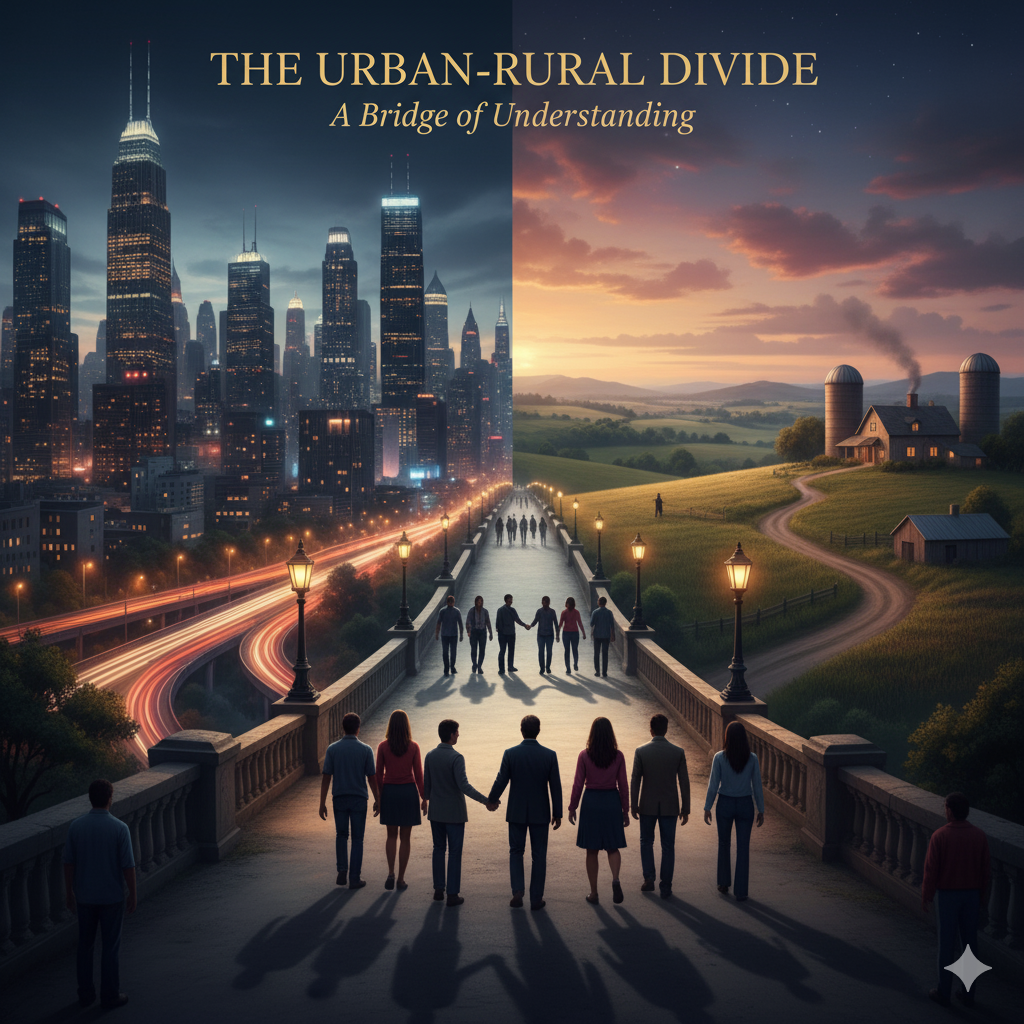
The purpose of this paper is to explore the deep, often unspoken reasons behind the political and cultural divide between urban and rural America. Before we begin, we must state with absolute clarity that this is a broad generalization. It does not, and cannot, account for the infinite nuances of individual human experience. The goal is not to place anyone in a box, but to build a bridge of empathy by exploring the different environments that shape our perspectives.
Part I: The Urban Tribe – A Symbiosis of Ambition
Cities are, and have always been, magnets for a certain kind of person: the one who is searching. They are often collections of individuals who have left their original homes in pursuit of a better life—more opportunity, more resources, a different kind of community.
- The Environment: The urban environment is one of constant motion, of close proximity to immense diversity, and of convenience. It is a world where access to resources is high, but so is the pressure to work longer, harder hours to maintain a foothold.
- The Social Contract: The urban “community” is not the traditional, tight-knit model of a small town. It is a different kind of symbiosis, a quiet agreement between millions of strangers to coexist, to respect each other’s space, and to contribute to a complex system that, for the most part, works harmoniously. It is a community built not on shared history, but on a shared future.
- The “Hard Work” of Progress: Cities are the hubs of academia, of science, of art. They are the places where the “software” of our society is written. The urban tribe is often engaged in the complex, abstract work that a rural population benefits from but may not always see or understand.
- The Worldview: This environment naturally fosters a worldview that is more open to change, more comfortable with diversity, and more reliant on complex, interconnected systems. It is a worldview that often aligns with the Democratic platform.
Part II: The Rural Tribe – A Symbiosis of Tradition
Rural America is the bedrock of our nation’s traditions. The people who live there are often those who have chosen to stay, to cultivate a deep connection to a specific piece of land and a specific community.
- The Environment: The rural environment is one of stability, of open space, and of a deep connection to the natural world. It is a world where self-reliance is a necessity and the bonds of community are forged over generations.
- The Social Contract: The rural community is built on a foundation of shared history, shared values, and a powerful sense of mutual obligation. It is a world where your word is your bond and your reputation is your most valuable asset.
- The “Hard Work” of Foundation: The rural tribe is engaged in the foundational work of our society. They grow our food, they extract our resources, they are the stewards of the land. This is the “hardware” upon which our entire nation is built.
- The Worldview: This environment naturally fosters a worldview that values tradition, stability, and a more dogmatic approach to life. When your world is built on the predictable cycles of the seasons, you are naturally more skeptical of radical change. This is a worldview that often aligns with the Republican platform.
Conclusion: Two Halves of a Whole
So what does this mean? It means the divide between the city and the country is not a battle between “good” and “evil.” It is a profound misunderstanding between two necessary and complementary parts of a single, complex nation.
The city is the “software,” constantly writing new code, pushing us forward. The country is the “hardware,” the stable, reliable foundation that makes all of that progress possible. You cannot have one without the other.
The path back to a healthier Republic is not for one side to “win.” It is for both sides to have the humility to recognize that we are not enemies. We are partners in a difficult and necessary mission. We are two different kinds of experts, with two different skill sets, living in two different environments. And we need each other.
The work of The Human Covenant is to begin the hard, necessary process of re-introducing these two tribes to each other, not as caricatures, but as fellow citizens who share a common home and a common destiny.
Leave a Reply